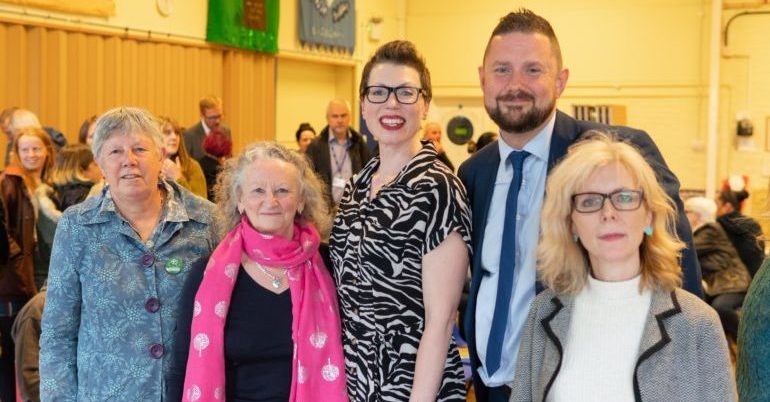The Brighton school fighting tooth and nail against becoming an academy

At a much-loved school, in the heart of a tight-knit community, in a northern suburb of Brighton, parents are furious and their children are upset. Teaching and support staff are worried, school governors feel disenfranchised, and local councillors and MPs are up in arms. All are ready to take on a fight.
The reason? An imposed academy order on Moulsecoomb Primary School after an Ofsted inspection graded the school ‘inadequate’. The school is legally bound to comply with such an order, thanks to the Coalition Government’s expansion of Labour’s academy policy to, ironically, ‘give schools more freedom’.
One of the main aims was to help improve the poor performance of pupils in disadvantaged areas. Moulsecoomb School is slap, bang in the heart of that demographic, in one of the 10% most deprived wards in the country. So, if the purpose of turning schools into academies was to help those like Moulsecoomb, what’s the problem?
Academisation is not the quick-fix solution the Government hoped for and is actually more likely to make a school worse. A study released last year showed that educational outcomes for disadvantaged children taught in academies are two thirds lower than those in local authority schools. Even Ofsted’s former chief inspector Sir Michael Wilshaw admits multi-academy trusts have not achieved the outcomes the Government promised and “are failing the poorest children”. Despite the evidence, the Government is yet to back down.
What’s supposedly wrong with Moulsecoomb?
Moulsecoomb Primary’s Ofsted report focused heavily on poor key stage 2 outcomes, which it stated as being due to poor standards of teaching, learning and assessment.
However, the report also noted ‘outcomes for pupils are rising’ and rated early years provision as ‘good’. The headteacher, who has been in post for 3 years, has instigated changes that are starting to work their way up the school. We await this year’s SATS results, published on 9 July, to know whether the pupils’ official outcomes have gone down at key stage 2.
Schools improve better under local authority control
Whether or not SATS results improve, change takes time and the school’s leadership team is working in a difficult environment. The school is much more likely to improve left under the auspices of a local authority that is home to a high number of schools defined as ‘good’ and ‘excellent’ by Ofsted. The council’s education team has put in place a comprehensive package of support, which it is confident will turn the school around.
Meanwhile, parents and carers do not accept the report’s assessment of the school. Warren Carter, a parent and governor at the school describes it as “an outstanding school with a warm heart” and sees its inclusive culture as a huge asset to the community: “Where many schools would show the front door to some of our more challenging pupils, the school bends over backwards to be inclusive going above and beyond to find a way of reaching and teaching them.”
The school’s community opposes the Government’s heavy-handed approach, which the Greens too see as a threat to local, democratic control. Parents are concerned that, as an academy, and thus outside the control of the local authority, the school will be less accountable to parents and the local community. The Government has no duty to consult parents or the local council. While a school within the council’s ‘family of schools’ has a board of governors drawn from the school community, including parents, an academy is run by a board of trustees with no connection to the community. Local residents have started an online petition , asking the secretary of state to revoke the academy order.
In my capacity as opposition spokesperson for the Children, Young People and Skills Committee on Brighton and Hove City Council, I co-proposed a motion with the Labour chair Nick Childs, at the first committee meeting of the new council on 17th June. The motion instructed officers to ballot parents and carers of children at Moulsecoomb Primary School. It called on the regional Schools’ Commissioner to note the efforts made by the local authority to improve the standards at the school, and to revoke the order, should the standards improve.
The Green Group of councillors in Brighton and Hove are also writing directly to Dominic Herrington, the Regional Schools Commissioner for South East England, urging him to revoke the order if the school shows signs of improvement.
Greens will continue the fight
Unfortunately, as schools with an ‘inadequate’ Ofsted rating are now automatically given an order to become academies, the law does not allow us to go further and request the order to be revoked, full stop. But the Greens agree with the Hands Off Moulsecoomb School campaign group, and see academisation order as unnecessary, unhelpful and undemocratic. We believe the Government should change this misguided policy and stop forcing schools to become academies.
Instead, it should be investing in our children’s future, rather than taking money away from schools. A recent Institute of Fiscal Studies report estimates spending-per-child nationally to have dropped by 8% per child since 2009. It stated that £3.8bn is needed nationwide to reverse school cuts. The current funding formula punishes schools like Moulsecoomb Primary, and £595 has been lost per child each year. The school has lost a staggering £388,000 since 2015.
The Greens helped parents fight off plans to turn Hove Park Secondary School into an academy in 2014. Fast forward to 2019, and thankfully we now have Labour and the Conservative councillors on our side too. Green MP Caroline Lucas and Green House of Lords member Jenny Jones (aka Baroness Jones of Moulsecoomb) are also on board.
No-one, it seems, thinks turning Moulsecoomb Primary School into an academy is either fair or right. No-one, that is, apart from the Government, and the academy trusts, whose CEOs with their six figure salaries, are waiting in the wings, ready to collect their spoils.




Leave a Reply